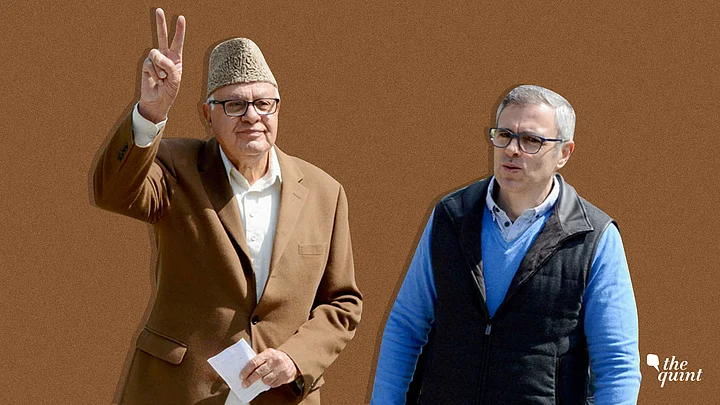“To get rid of fascist forces” and to protect Kashmir’s autonomy—if not restore it to former levels—are the National Conference’s twin aims for the Lok Sabha elections.
In an exclusive interview with The Quint at his Srinagar residence, NC President Dr Farooq Abdullah also said that his party sees itself as allying with a range of secular parties rather than specifically with the Congress.
He named Mayawati, Akhilesh Yadav, and the chief ministers of West Bengal and Andhra as leading lights of what he described as secular politics.
Hum Kya Chaahte? Maximum Autonomy!
Abdullah alluded to Prime Minister Narasimha Rao's promise that “the sky is the limit” for the degree of autonomy Jammu and Kashmir could have. Abdullah emphasised that Rao had said this in the Lok Sabha, not outside.
This was another way of saying what his son and the party’s vice-president has specifically said in a public speech—that, among other facets of an autonomy package, the party would try and restore the titles of ‘prime minister’ and ‘head-of-state’ for those who rule Jammu and Kashmir.
Abdullah said his party would “go to any extent” to protect the Kashmiri people’s constitutional rights. “We never asked for azadi,” he added, but wanted maximum autonomy.
Autonomy: A Competitive Electoral Issue in J&K
Autonomy has willy-nilly become a competitive electoral talking point for the Valley’s major regional parties. Both the NC and the PDP have promised to preserve Articles 35-A and 370, which pertain to the state’s special status in the Indian Union.
Abdullah’s son and the party’s vice-president, Omar Abdullah, has upset many across India by promising that (as part of an autonomy package) his party would try and restore the titles of prime minister and head-of-state for the state’s top functionaries.
Sheikh Abdullah had obtained that under the New Delhi Agreement in 1952. The state continued to have a prime minister until February 1964.
Protecting State’s Special Constitutional Provisions
Linking his party’s two main agenda points, Abdullah asserted that Kashmir had not acceded to a theocratic but to a secular India—the India of Gandhi and Nehru and the equal rights that Dr Ambedkar promised. He added that `the biggest issue (in the Lok Sabha polls) is to get rid of the fascist forces.’
He held that the current ruling establishment was “shouting from the top of the mountains” that it wanted to withdraw the state’s special constitutional provisions.
He said that, by applying GST to the state, the previous government—which he called the “puppet regime of the PDP and the BJP”—had already eroded the state’s autonomy.
He added that he was very sad that Finance Minister Arun Jaitley (who has close links with the state) had done this.
Governor’s Rule Has Been a Disaster
Overall, Abdullah held that the Governor’s administration had been “a disaster.” Contractors’ payments had been delayed, and officers transferred again almost as soon as they had been posted. There was “no accountability,” he asserted.
Abdullah added that the governor had told his son and party vice-president, Omar, during a recent meeting that he had not been consulted before the security of a number of senior political figures had been removed.
Omar to be Chief Minister if NC Wins
Abdullah asserted that Omar would be the Chief Minister of Jammu and Kashmir if the party won the assembly polls, whenever these were held.
He described Omar as young, dynamic, and full of life and strength. Although Dr Abdullah holds the reins of the party as its president, Omar has taken the lead in the election campaign and holding press conferences.
Asked about the emergence of former IAS officer Shah Faesal in the political arena, Abdullah held that Faesal had been a good officer, but asked: “What is his aim?”
He pointed to news that Faesal, who recently launched a new party, had not yet been removed from service. Referring to emergent political formations, Abdullah said the elections would be “a test of their standing”—if the election process was honest, machines were not manipulated, and forces such as the BSF not misused.
He added that, when electronic voting machines were first introduced, the election commission had told his colleagues that they were liable to tampering.
Abdullah said that improving education and health care would be his party’s main administrative priority if it took charge of the state government. He referred to the sort of national health service there is in the UK as a model.
He agreed that Prime Minister Modi’s scheme for major health costs was a good idea, but held that such schemes were not implemented well. Even the sanitation scheme, he claimed, only entailed digging pits.
(At The Quint, we question everything. Play an active role in shaping our journalism by becoming a member today.)
